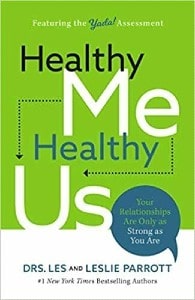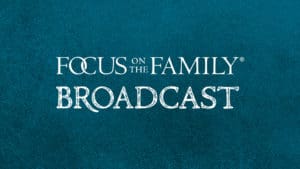Preview:
Dr. Leslie Parrott: The best gift I could ever give my relationships is to work on who I am within them. And as I change, the transformation isn’t a private one. It begins to ripple out to every bond I build.
End of Preview
John Fuller: That’s Dr. Leslie Parrott, and she’s with us today on Focus on the Family, along with her husband, Dr. Les Parrott. And your host is Focus on the Family president and author, Jim Daly. I’m John Fuller, and thanks for joining us.
Jim Daly: John, what we do here at Focus, pretty much is marriage at the heart of everything because families, that’s where it all begins. Parenting is important to us as well, but it starts with marriage and keeping marriages healthy is the goal. And we want to make sure we’re doing all we can to fulfill that part of our mission. And today, we’re gonna have a great discussion about getting healthy in yourself so that those around you, including most importantly, your spouse, you can have the healthiest relationship possible. And you know, the fact is, if you want a healthy marriage, you have to be healthy yourself. That’s the bottom line. That’s what our guests are talking about with us today.
John: And Les and Leslie have been married since 1984. They have two sons. And Les is a clinical psychologist, Leslie, a marriage and family therapist. And they’re very popular conference speakers and relationship experts and a, bestselling authors. And today, we’re gonna be touching on their book, Healthy Me, Healthy Us. The subtitle is, Your Relationships Are Only as Strong as You Are, really driving home, uh, Jim, that point you were making.
Jim: Les and Leslie, let me welcome you to Focus on the Family, welcome you back.
Leslie: We love being with friends.
Jim: Now, let me, let me just start off with this idea of, what’s the biggest question that you hear in this context of healthy marriage, healthy me, when you’re counseling and speaking? What is it that couples will come and say to you?
Dr. Les Parrott: Well, we’ve been hearing it for years, haven’t we?
Leslie: Yes.
Les: I mean, the question is, well, what do we do? What’s the secret to a good relationship? We hear that time and again.
Leslie: Yeah. If there was one thing, you know-
Jim: Here, it is.
Leslie: … you always wanna leverage, what’s the big defining thing? Yeah, that’s the question.
Les: And-
Jim: (laughs)
Les: … we say, the answer is found in two words, get healthy. And when we say that, we mean psychologically, emotionally, relationally, spiritually healthy.
Jim: And the problem is, you can see that, but how do you get from point A to point B? I mean, that’s what makes life so difficult for people that are limping, if I could say it that way. Emotionally, spiritually, they’re not healthy.
Les: Right.
Jim: So first, you have to assess, where am I?
Leslie: Right.
Jim: Now, here’s the problem that, you know, would never happen in my marriage.
Leslie: (laughs)
Les: (laughs)
Leslie: Of course not.
Jim: I have a friend who-
Leslie: (laughs)
Jim: … you know-
John: Why are you looking at me?
Leslie: (laughs)
Jim: Well, I thought you were my friend, John. But you know, you always… Oh, I shouldn’t say always, right? But you look to your spouse’s flaws so quickly.
Leslie: Oh yeah.
Jim: You know, we’d have a better marriage if my spouse didn’t do fill in the blank. Uh, why is that not a wise way to go?
Leslie: (laughs) Well, I mean, I love that because everyone relates, right? It is so clear what everyone else can do-
Jim: (laughs)
Leslie: … to change this relationship we’re in. But why it doesn’t work is because we don’t recognize that who we are is totally contagious. And the ripple effects that go out from our presence in a relationship completely change the dynamic of the relationship. It’s powerful.
Les: Well, and that’s why we say… In fact, the whole book hinges on this very sentence, that your relationships, not just your marriage, any relationship, your relationship with your kids, your relationship with, you know, whoever, uh, your relationships can only be as healthy as you are.
Leslie: Right.
Jim: And we’re gonna continue through the program, we’re gonna talk about those steps that you need to take. I wanna go back. In the book, you had an experience, uh, looking at art. I think it was Michelangelo’s David-
Les: Yeah, yeah.
Jim: … uh, the statue, which is I’ve seen it as well. I mean, it is-
Leslie: Right.
Jim: … amazing.
Les: Yeah.
Jim: Uh, but you actually took a little detour-
Leslie: (laughs)
Jim: … at the museum, and I thought that was really funny and profound.
Les: Yeah. I don’t know what season you were there, but when we were there, it was so hot-
Jim: (laughs)
Les: … and people were lined up.
Leslie: (laughs)
Jim: Same one.
Les: Yeah. (laughing).
Jim: It’s always the summer.
Leslie: Yes.
Les: And, uh, but it was, you know, an incredible thing to see something that you’ve studied all your life and Michelangelo’s life and all that. And so, while people were all crowded around this incredible statue of David, you know-
Leslie: Our biblical hero. Yeah.
Les: Yes. Um, we thought, well, let’s see if the crowd will kind of thin out. We wandered down a, a, you know, a hallway and stumbled onto these things that, uh, are known as the captives. And they’re blocks of stone that, um, Michelangelo started and never finished. And so you might see an arm protruding here.
Jim: His practice, really.
Les: Yeah. Or he, he said it was always freeing the stone to be what it needed to be, and he just said, these just, they stopped. Right? They never became whole. And as we sat there, I remember we sat on this bench-
Leslie: Right.
Les: … and we were looking at those. And I said something to the effect of… You know, you can’t help but to think about yourself as you’re looking at those, “What’s unfinished in me?” Right? And-
Jim: That’s a great first question.
Les: Yeah. And it really kind of spawned a conversation between the two of us-
Leslie: Yeah.
Les: … about getting healthy.
Leslie: Yeah. We had this deep sense because we all have this sort of ache in our soul. We know there are things in us that are still captive that God would like to more fully heal.
Jim: Yeah.
Leslie: You know, things that we can grow in and, and there’s a best self we are not arriving at yet.
Les: And by the way, nobody arrives. Right?
Leslie: Right.
Les: Nobody woke up.
Leslie: (laughs)
Les: Did you wake up this morning, Jim, and go, “Hey, I guess this is it, I can check it off my list, I’m whole”?
Jim: You kiddin’? I couldn’t see. I had to put e- eye drops in my eyes.
Les: (laughing)
Leslie: (laughing)
Jim: I was going, “Man, my eyes are going bad.” I was trying to read your book going, “What happened here?” So…
Les: We’ll get you a large print edition, but-
Jim: Yeah, I mean, thanks a lot.
Les: (laughs)
Leslie: (laughs)
Les: But you know what I’m saying? That we, we all think, uh, that this is somehow we can somehow check it off our list eventually. And, and we even think, maybe if I get married and I lean into this person, there’ll be a shortcut to my wellbeing.
Leslie: Right.
Les: And nobody can do that for you. That’s ultimately the work that we do with the Holy Spirit in our life, not this other person. As iron sharpens iron, we can help each other on the pathway, but we can’t rely on that person to do that.
Jim: It’s true. Let’s get into some of the, you know, points of the book.
Les: Yeah.
Jim: You mentioned unhealthy versus healthy. So give us the attributes of the healthy person.
Les: Yeah. Well, the first thing is they’re self-aware. It’s difficult. In fact, we, psychologists love to say, awareness is curative. Once you become aware of something, then you can do something about it. I went into our son, Jackson’s… He’s a teenager. I went into his room a few nights ago and he plays the guitar. He had a couple of guitars. One was on the floor, one was on his bed. He was leaning against his bed. He was reading. There must have been a million books, you know, on the floor. And I just said, “Jackson, look at this room.”
Leslie: (laughs)
Les: He goes, “What?” I said, “It’s crazy in here.” “What do you mean?” I said, “Look at it.” And he looked around and he goes, “Oh, yeah. It’s kind of messy, I guess.” And I didn’t say anything else. That’s all I said and I walked away. A couple of nights later, I came in, guess what? Everything was cleaned up.
Jim: You’re kidding?
Les: (laughs) No.
Jim: How is it that easy?
John: Should come to my house.
Jim: Okay, that’s crazy.
Les: (laughs)
Jim: You need to write a parenting book on how to get your kids to clean their room.
Les: Well, that’s the point, awareness.
Leslie: Yeah.
Les: Awareness is curative.
Leslie: Miracle of awareness.
Jim: Yeah.
Leslie: Yeah.
Jim: So awareness is good. You have proactive, resilient, optimistic, confident, empathetic, humble, grateful, growing. Kind of sounds like the fruit of the spirit.
Leslie: It does, doesn’t it?
Jim: Yeah.
Leslie: Yeah. Because like for instance, proactive, I mean, the opposite of proactive is where you get stuck because you’re placing blame. You know, you’re shifting blame, but proactive is-
Les: You’re reactive.
Leslie: … I’m owning my life. You know, I’m owning, “What can we do? How can I be a part of whatever’s getting stuck right now?”
Les: Yeah. I think another important one is there’s a sense of humility on the healthy side. Uh, whereas on that unhealthy side, there’s a sense of entitlement. We hear that word-
Leslie: Yes.
Les: … tossed around these days. But, uh, we all can fall victim to that. The person that is growing, that’s maturing is humble about recognizing, “I can’t do this on my own. God, help me be the person I need to be in this situation.”
Jim: Well, and that’s a healthy Christian actually.
Les: Yeah.
Jim: That’s, that fills in the scripture that says, “We’re all sinners saved by grace.”
Leslie: Yes.
Jim: Right? When we really understand that, that we’re not better than anybody else. It’s just we see what we believe is the truth about who Jesus was. Let’s hit those unhealthy descriptors, just to make sure people are capturing those. So the healthy is self-aware, proactive, resilient, optimistic. The list is in your book. People can get a copy. Unhealthy, describe some of those.
Leslie: Well, it starts right out with self-absorbed, which is the opposite of self-aware. Self-aware, you know, is a great thing. But self-absorbed is all about me and all I can see are my own needs. So it’s a very consuming thing. You’re not able to be fully present to other people and offer yourself as a gift.
Les: Have you ever been with somebody where the conversation is, uh, just so focused on them, you realize there’s no curiosity within them about you?
Jim: Yeah.
Les: You know, we call it their curiosity quotient. It’s a zero.
Leslie: (laughs)
Les: And, and I’ve studied this. In fact, you know, so many times, we’re speaking someplace and we get in a car with somebody and they’re taking us. And I always say to Leslie, “How long do you think it’ll take before they ask us a question other than, ‘How was your flight’ when we first get in the car?”
Jim: (laughs)
Les: And it’s a pretty good indicator. It’s a barometer of reading of how comfortable they are in their own skin.
Leslie: It’s amazing.
Jim: Yeah. Let, let’s move to the hallmark of health. What are those three things you point out in the book that really do set you on the right path?
Les: Well, let me tell you something.
Leslie: Yeah.
Les: We did a lot of research on this. This is the first question after somebody says, “Okay, what’s the secret to a healthy relationship?” Well, get healthy. Okay, well how do I get healthy?
Jim: Correct. That’s always the question.
Leslie: Give me the map.
Jim: Yeah, the shortcut.
Les: Yeah. And so, what we’ve tried to do is put these three stepping stones in order and they really build on each other.
Leslie: Mm-hmm. Yes, they’re sequential.
Les: But these three stepping stones, and you repeat them because it’s not like you… Like I say, you can check it off your list.
Leslie: Right. It’s not a once, one and done. It’s a circular thing ever deeper, ever healthier, but the first is just a sense of profound significance.
Les: Yeah.
Jim: About yourself though.
Leslie: Yes.
Les: Yes.
Jim: That seems counterintuitive.
Leslie: It seems counterintuitive, doesn’t it?
Les: Yeah, it doesn’t seem-
Jim: It feels a little awkward. Well, you know, look at me, I’m so special.
Leslie: (laughs)
Jim: But that’s not what you’re saying.
Les: It’s recognizing how profoundly significant you are in the eyes of God.
Jim: Which is the difference.
Les: And you have to recognize. In fact, you know, as we walked into the doors of Focus on the Family to do this broadcast today, I was reminded of so many friends that we’ve had here. And one of those friends who’s in heaven now, HB London.
Jim: I was gonna mention that, yeah.
Les: And he nearly every Sunday would say something to the effect of, “God loves you as if you’re the only person on the planet to love.” Only later did I realize, he stole that from St. Augustine.
Leslie: (laughs)
Jim: Yes.
Les: But, uh, but, uh, you know, that is, that’s what we’re talking about here, being profoundly significant. A- and by the way, it’s not just saying it and knowing it or quoting scripture, you know, Romans 8, “There’s therefore now, no condemnation for those of us in Christ Jesus.” We might be able to quote that or sing about God’s amazing grace in these wonderful hymns and all that. I’m talking about feeling it deep down in your bones, letting it resonate in your spirit, not just so you can talk about it, but you feel it.
Jim: Well, what you’re saying is you believe it.
Les: That’s right.
Leslie: Yes.
Les: Believe it and experience it.
Jim: Yeah.
Les: That’s right.
Jim: Before we get to two and three, John needs to tell people how to get a copy of this-
Les: (laughs) Yes.
Leslie: (laughs)
Jim: … because I wanna see 20,000 of these fly out of Focus.
John: Yeah, here we go. So Healthy Me, Healthy Us: Your Relationships Are Only as Strong as You Are. And uh, of course, we do have copies of that here at Focus on the Family. Uh, call 800, the letter A and the word, FAMILY, or stop by focusonthefamily.com/broadcast.
Jim: So Les, uh, go to number two and three, and then we’re gonna come back and do a little deeper dive with each one.
Les: Okay. So here’s the three of them. Profound significance, second is unswerving authenticity, and the third is self-giving love. Now, the first one has to do with relating to God. The second is relating to yourself, and the third is relating to everybody else.
Jim: No, that’s good. Well, let’s, let’s peel it back. Um, you in the book, you mentioned something you observed, Gary Smalley, the late Gary Smalley, a great friend of all of ours.
Leslie: Absolutely.
Jim: And Greg Smalley and Erin are on the team here at Focus and it’s great to have them here. And all the stories of that family, they’re hilarious.
Leslie: (laughs)
Jim: But um, you had an observation about something Gary did on stage one time that proves, I think the point you’re making in number one. What happened?
Les: Yeah. I remember Gar… We were speaking, I think in Portland, Oregon-
Leslie: That’s right.
Les: … at the Rose Garden.
Leslie: Yeah.
Les: Big arena. You know, there must have been 7,000 people there. And he did something that captured everybody’s attention.
Leslie: Yeah. Of course, he’s a masterful communicator-
Les: Great storyteller.
Leslie: … already. And he was, he was just the art of the object lesson.
Les: Yeah.
Leslie: Right.
Les: And, and so he pulled out, I think it was a $50 bill, maybe a $100 bill, and he just said, “How many of you want this $100 bill?” Well, the place went crazy, of course. And some people even started to rush the stage.
Leslie: (laughs)
Les: I’m not kidding you.
Leslie: In this arena.
Jim: And these are Christians, right?
Leslie: Yeah.
Les: It was a marriage conference, for Pete’s sake.
Jim: The shortcut.
Les: (laughs)
Leslie: Yeah. There you go.
Les: And uh, he said, “Well, of course, everybody wants it, but let me do this to it.” and he crumpled it all up and, uh, “Who wants it now?” And everybody said, “Yeah.” And then he put it on the floor and he, and he ground it down.
Leslie: (laughs)
Les: He put some dirt on it, you know, and stomped on it. “Who wants it now?” And everybody said, “Yeah, we still want it.” And he said, “Why? You still want it because it still has value, right?”
Leslie: Right.
Les: And I can tell you, we have some listeners right now-
Leslie: Mm-hmm.
Les: … that feel like, “Yeah, you guys don’t know my story. You don’t know what I’ve done. Profound significance for me, mm-mm, doesn’t fly for me.” And they’re just like that currency. They still have value. When maybe somebody says, “Oh, I don’t want that. Look how filthy that is.” Right? And we discount it because of what that person might have done. God doesn’t do that. And that’s why it’s this profound-
Leslie: Right.
Les: … significance deep in your bones.
Leslie: Yeah. I mean, what’s so true about significance is this is nothing that you can achieve. We don’t earn it. This is why this is a, a thing full of humility. It’s a gift we receive from God.
Les: Right.
Leslie: And it’s inherent, our belovedness and… But we have to draw near to God in order to experience that in our soul. And once we have that true experience, that shapes everything about how we connect with others.
Les: A- and the way to do that is to focus on the single most important conversation you ever have. You had it this morning, you’re gonna have it tonight, you’re gonna have it even while you sleep because this conversation is 24/7. It’s your internal dialogue. It’s your self-talk.
Jim: Huh.
Les: Imagine if before you fell asleep tonight, you could pull a little computer chip out of the back of your head and put it into your laptop and it would tabulate all of your self-talk for the last 24 hours.
Jim: Yeah.
Les: And it would dump it into one of two categories, either positive or negative. Which of those would be most full for you at the end of any given day? If you’re like most people, on average, 78% of that self-talk would fall into the negative bucket.
Jim: Mm-hmm.
Les: And we know this from research at UCLA. This is in armchair psychology, but not the person who has a lock-
Leslie: Right.
Les: … on their profound significance. But that’s where it begins, that’s that awareness we’re talking about, tuning into those tapes that we play in our head.
Jim: Yeah. You know, the word that, that’s coming to my mind is identity.
Leslie: Mm-hmm.
Jim: I mean, some of that plays into this. Um, it’s how you form your identity in Christ. Right?
Leslie: Right. And Christ is the key there.
Jim: He’s the key.
Leslie: Right.
Jim: And you’re trying to see yourself from that position of identity in Christ.
Les: Who am I, right?
Jim: Who am I?
Les: That’s exactly right, a child of God.
Jim: And the scripture is clear on that. Before we move to number two in a little more deeper way, um, how does a person who is the crumpled $100 bill, maybe the one that’s been stomped on in your illustration, how do they begin to reshape their identity and their perception of themselves? The broken person, I love that scripture. He’s close to the broken-hearted-
Leslie: Right.
Jim: … and saves those crushed in spirit. That’s the analogy.
Les: Yeah.
Leslie: Right. One of the big, uh, sort of life work things we do is begin to move past our past.
Les: Right.
Leslie: We have to start dealing with some of the unfinished business in our life. And, and that’s really how we begin to receive that sense of profound significance, by letting God gently, you know, bring to the surface our wounds and heal us little by little. And that, that’s a process.
Les: And I love what you said about bringing it into awareness. Because so many times… And this is one of the indicators of needing to work on this idea of getting healthy. When we take our secrets, we take our woundedness, we take the things that, that really consume us, resentments, and we hold them underneath the surface, almost like we’re holding a basketball underneath the water.
Jim: Mm-hmm.
Les: Have you ever tried to do that? That’ll wear you out.
Jim: I think I hit myself in the chin the last time-
Leslie: (laughs)
Les: (laughs)
Jim: … I did that.
Les: Exactly.
Jim: Just saying.
Leslie: Yeah.
Les: But so many of us can walk through life with that same emotional energy, trying to stuff all that stuff down.
Leslie: Right.
Les: And so when Leslie says, “Get past your past,” we have a whole chapter. There’s two chapters for each of these things. And the first is tuning into your self-talk and the second is getting past your past. So that person that is feeling crumpled, those two things are vitally important. They’re vitally important for all of us, but particularly that person that’s feeling unworthy.
Jim: Alright. We gotta get moving. My favorite, unswervingly authentic. How does vulnerability play into authenticity?
Leslie: Uh, vulnerability is everything, right? Because when we’re authentic, we’re just comfortable in our own skin. And again, this takes a measure of humility because we’re not talking about perfection. We’re talking about just honesty and integrity with who we are, how God has designed us to be. And we’re not letting ourselves become a reflection of everyone else. We’re tuning in to what the spirit is telling us is our calling-
Jim: Right, yeah.
Leslie: … in life.
Les: I can’t tell you how many times I’ve had somebody come into our counseling office, struggling with that proverbial disease to please.
Leslie: Right.
Les: Do you know what I’m talking about?
Jim: Yeah, sure.
Les: That person that walks around on eggshells thinking that, “Oh, maybe if I did this thing over here, I’d get so-and-so’s attention. Oh, maybe if I did this, mom and dad would give me their blessing. Maybe I’d get accepted into this group if I made this decision.” This person has a lock on knowing that God has called them to travel this path in spite of what anybody else says.
Jim: But I mean, they call them blind spots for a reason.
Leslie: Oh yeah.
Jim: So, you know, how, how do we become more aware of our blind spots, which is where you’re going to find out more accurately who you are.
Leslie: Yeah. There’s a treasure trove there. When you can drop defensiveness and just be willing to ask for feedback and receive it, it takes some courage. But we all have blind spots, so you-
Jim: Give us some common ones.
Leslie: You know, oh my goodness. Well, here I am. I’m a trained counselor, and, uh, we’ve been married, you know, for three plus decades. And one day, Les said to me, “You’re not, you’re not good at listening to me.” And I thought, “I’m a professional listener.”
Jim: (laughs)
Leslie: “You are so wrong.”
Jim: Now we’re talking.
Leslie: Everybody comes to me with their problems.
Les: (laughs)
Leslie: What he meant, and as soon as he said it, I got defensive. But over time, I started paying attention and here’s what happened. I realized, I am so eager with this person who I love more than anyone on the planet-
Les: That you would…
Leslie: Finish his sentences.
Jim: (laughs)
Les: (laughs) That’s it.
Leslie: I won’t let him say what he thinks and feels. I interrupt him before he’s to the end, and I start telling him how he thinks and feels.
Jim: I hope Jean is not listening right now.
Leslie: (laughs)
Les: (laughs)
Jim: That’s my thing.
Leslie: Is that your thing?
Jim: Yeah.
Leslie: Okay. So, blind spot, I thought that was my best strength-
Jim: (laughs)
Leslie: … and it was clearly not, but it takes a dropping of defensiveness, and then it just melted my heart. And it actually gave you patience with me that I was aware of it and humbled.
Jim: Yeah. And that’s good, that’s a positive.
Leslie: Yeah.
Jim: Okay. Let’s get to the last one, uh, that last hallmark is self-giving love.
Leslie: Mm-hmm.
Jim: Um, I think that is the demarcation of a Christian, right? That ability to love another.
Les: Yeah.
Leslie: Right.
Jim: I mean, everybody has capacity to do that, but to do it in Christ, is should be deep and profound.
Leslie: Yes, yes. And not shallow and complicated. Yeah. Yeah, this is where it becomes about other people. This is now where we walk the road through health to the other person-
Les: Yeah.
Leslie: … and begin to connect to you.
Les: And this is where you begin to love the life you live. Right?
Leslie: Oh, absolutely.
Les: Because life gets pretty exciting when you begin to give your life away to other people. Right? And it’s very difficult to do that without getting a lock on your profound significance, that God loves you as if you’re the only person on the planet to love. And then you begin to follow that path that God has called you and your profound significance and it is coupled with unswerving authenticity. And then all of a sudden, you begin to recognize that other people have needs that aren’t always the same needs that you have. You begin to transcend your own boundaries to recognize other people’s needs. And in my opinion, I think this is where you begin to put into practice the greatest relationship lesson that has ever been taught. It’s the greatest relationship sermon that has ever been preached. Right? We call it the Sermon on the Mount.
Leslie: Right.
Les: And Jesus gave us so many radical things in, in that message, but the one that stands out to me is where he says, “Hey, you wanna do something that will turn your relationships inside out?” He said, “Don’t just walk the first mile. Everybody sees that coming. We do that to clear our conscience.” He said, “Walk another mile. Nobody’s expecting that. See what happens in your life.”
Leslie: There are defining moments where somebody offers you that extra mile moment. Sometimes it’s small, sometimes it’s epic, and it becomes a defining point of grace. I actually had one of these in our story. Because in that season of life when I was a frazzled mom, I had so much on my plate and I was headed out to run some errands and quickly realized, my little guy had fallen asleep. So I zoomed back to the house knowing Les was home, carefully lifted him out of the car seat so as not to wake the sleeper, which is a miracle when that happens, you know, dropped him off at the house, hopped back in my car, just full of energy to go get my errands done unencumbered. And as I backed out of the garage, there was this giant collision and it happened that I had left the car door open. And as I backed out, the car door ripped off the car and dismantled our garage door at the same time.
Les: I was upstairs in my study.
Jim: You heard it?
Les: I thought it was an earthquake.
Jim: Yes.
Les: It was incredible, shaking through the house. Yeah, that was a big one.
Leslie: In that moment, you know, I had not shut the car door not to wake the sleeping child. And then I created this epic collision.
Les: (laughs)
Leslie: However, in that moment, I, you know, just everything in me is undone. Les walks up to me and just wraps his arms-
Les: I ran down to you because I thought, “What in the world just happened?”
Leslie: Yeah. Maybe you’re just grateful I was alive-
Jim: (laughs)
Leslie: … but he didn’t say one word. I mean, it was the most, uh, compromising moment I could imagine. Just walked up to me, gave me a little kiss and said, “Hey, we’ve been needing a new car door.” And that was it. Never one other comment.
Jim: Now let me, let me land here. Um, someone’s been listening and they’re going, “Okay, my marriage isn’t in a good spot. There’s something going on. I’ve not been able to put my finger on it. I don’t have a great relationship with my parents, my siblings, my friends, whatever. And they’re saying for the first time, maybe it is me, maybe there’s something in me that is causing these broken relationships.”
Leslie: Mm-hmm.
Jim: That actually is a good place to start. That’s the right observation. What would you say to that individual who is hearing you and going, “Okay, I catch it. I get it. Now what?”
Les: Well, the person that’s saying that is taking the very most important step right there-
Leslie: Right.
Les: … and going, “Maybe I’m bringing something to this that needs to be corrected,” that awareness.
Leslie: And rather than feeling shame, it’s an empowering thing to recognize that the best gift I could ever give my relationships is to work on who I am within them. And as I change, the transformation isn’t a private one. It begins to ripple out to every bond I build and it’s amazing.
Les: Our relationships are like a mobile that hangs from the ceiling. And if you change one little piece of that, it has to find new equilibrium and new balance. And one person… You know, we always hear these people, “I, I’ve tried everything. I can’t do anything. He needs to change.” Right? But when you work on becoming whole, becoming the person that God created you to be, it’s incredible what happens to the equilibrium in that relationship. Because all of a sudden, other people around you start to go, “Oh, there’s new dance steps here. I gotta figure out…” Uh, this unhealthy way we were behaving, it doesn’t work anymore with her or him.
Jim: Yeah. And it’s so good. Uh, Les and Leslie, uh, really strong stuff from you guys. This is a lifetime effort. You guys have talked to so many people. You’ve taught, you’ve counseled, you’ve spoken at so many large events, and you’ve put all that wisdom into this. And I, I just hope people are catching it today. Because I know how much effort it takes to capture these themes, read the Word, understand it, apply it to the experiences that you’ve had in counseling. You’ve done a great job.
Les: Oh, thanks.
Jim: And let me turn to the listener or viewer. I mean, I can’t imagine that you don’t know somebody if it’s not you, that needs some help, or your spouse (laughs). Somebody in your orbit needs a copy of this book. And so often, you know, we say, “Give a gift of any amount.” Become a monthly pledger, just a single one-time gift and we’ll send it as our way of saying thank you, a copy of this great book. But also, we often say, we believe in the content so much that if you can’t afford it, we’re gonna trust other people who will cover the cost of that. So literally, let’s move these books out of Focus on the Family. Don’t order from that big online company.
Les: (laughs)
Leslie: (laughs)
Jim: They just pay it to their shareholders. Put it to work here at Focus. When you get the copy of the book here at Focus, it goes back into saving marriages, saving a baby’s life. I mean, I don’t think the other guys are doing that. So why don’t you help us do ministry together and, uh, get a copy of Les and Leslie’s great book, Healthy Me, Healthy Us today.
John: Donate and uh, take our free marriage assessment as well. The details are on the website, focusonthefamily.com/broadcast, or call 800, the letter A and the word, FAMILY, 800-232-6459. And I’ll add that if your summer vacation plans bring you to Colorado, we’d love to have you visit the Focus on the Family Campus. Our welcome center and bookstore are full of fun activities for kids and adults. And you can even visit Whit’s End Soda Shoppe just like in Adventures in Odyssey. And we’re hosting a special exhibit this summer highlighting the life of Elizabeth Elliot. There’s so much here. We hope you can drop by. Well, join us again tomorrow as you’ll hear the story of an unlikely friendship between a pastor and an atheist.
Craig Cooper: We bonded over dreams and we bonded over brokenness. Um, both of them happened and the Lord just created this, this friendship that was like the smile of God.
John: Thanks for listening to Focus on the Family with Jim Daly. I’m John Fuller, inviting you back as we once again help you and your family thrive in Christ.


















